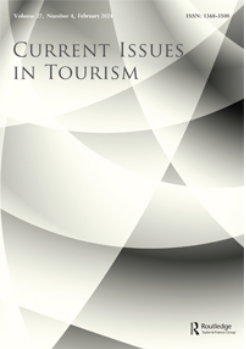The dynamics of perceived justice and its outcomes in the online tourism sector: inter-relationships and temporal and carryover effects
IF 4.6
3区 管理学
Q1 HOSPITALITY, LEISURE, SPORT & TOURISM
引用次数: 0
Abstract
The consequences of perceived justice are dynamic. The way in which perceived justice is evolutionarily dynamic in customers’ emotional states and loyalty intentions remains unclear, particularly in studies distinguishing between initial and final recovery phases. Using two time-lag intervals targeting the same respondents, our findings show that perceived justice–recovery satisfaction increases over time; however, the other two direct linkages, perceived justice–customer forgiveness and perceived justice–loyalty intentions, remain unchanged. Interestingly, the recovery satisfaction–loyalty intention linkage is stable, whereas the customer forgiveness–loyalty intention linkage decreases incrementally. Additionally, only the carryover effect of perceived justice is significant, but the other three carryover effects do not exist. Our results suggest that from the initial to the final recovery stage, managers must redesign their overall recovery strategy based on customer responses and behaviors.在线旅游领域感知正义的动态及其结果:相互关系、时间和延续效应
感知正义的后果是动态的。在顾客的情绪状态和忠诚意图中,感知到的公平是如何演变为动态的,这一点尚不清楚,特别是在区分最初和最终恢复阶段的研究中。使用两个针对相同受访者的滞后时间间隔,我们的研究结果表明,感知正义-恢复满意度随着时间的推移而增加;然而,感知公正-顾客宽恕和感知公正-忠诚意图这两个直接联系保持不变。令人感兴趣的是,恢复满意-忠诚意向的联结是稳定的,而顾客原谅-忠诚意向的联结是递增的。此外,只有感知公正的结转效应显著,其他三个结转效应均不存在。我们的研究结果表明,从最初到最后的恢复阶段,管理者必须根据客户的反应和行为重新设计他们的整体恢复策略。
本文章由计算机程序翻译,如有差异,请以英文原文为准。
求助全文
约1分钟内获得全文
求助全文
来源期刊

Current Issues in Tourism
HOSPITALITY, LEISURE, SPORT & TOURISM-
CiteScore
15.50
自引率
10.00%
发文量
230
期刊介绍:
Journal metrics are valuable for readers and authors in selecting a publication venue. However, it's crucial to understand that relying on any single metric provides only a partial perspective on a journal's quality and impact. Recognizing the limitations of each metric is essential, and they should never be considered in isolation. Instead, metrics should complement qualitative reviews, serving as a supportive tool rather than a replacement. This approach ensures a more comprehensive evaluation of a journal's overall quality and significance, as exemplified in Current Issues in Tourism.
 求助内容:
求助内容: 应助结果提醒方式:
应助结果提醒方式:


